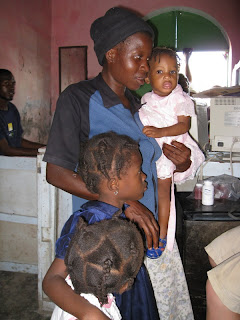Our first day in Gonaives, we climbed into boots, loaded backpacks full of medicines and bandage supplies onto me and Ann, and hiked a mile through mud and standing water to a school where people had taken shelter since the hurricanes. We set ourselves up in a small classroom while people filled up the hallway just outside. Within minutes, there was over a hundred people pushing and shoving, vying for an early spot in the line. I climbed up on a desk and began to yell, “You have to line up and wait calmly; otherwise we won’t see anyone. We’ll just pack up and go home!” I think that they were so shocked to hear a white person speaking Creole that they got quiet and listened. With the help of Pastor’s men, we got them lined up, we prayed with them, and then we started bringing in the mothers with children, one by one. 


Since Ann and Mary don’t speak Creole, I did all the talking. If someone needed a bandage, I would send them to the corner where Ann would doctor them up. Mary grabbed meds for me as I asked for them and got lots of photos of our work. Ann also stood by with extra bags and a Sharpie to mark bags of medicines for me if I wanted a different dosage for a child or for an elderly person. I know that it must have been frustrating for them to not fully understand what the patient or I were saying, but in the interest of getting the maximum number of people seen, they didn’t complain about it once. 

We had been working at the school for nearly 3 hours when a woman arrived and asked why we hadn’t come to her home yet. Apparently, Pastor had arranged for us to visit 6 or 7 different locations that day. He had had no idea how many people would want to be treated in each location. We were running out of supplies anyways, so we stopped, leaving about 15 people untreated. (None of them looked particularly ill or else we would have pulled them forward in the line). We hiked back through the mud to the hotel, where we ate a quick lunch, prepared more baggies of meds and creams, and then hiked another mile to the woman’s pharmacy. 
At the pharmacy, we sat on stools in a tiny room while our men kept people outdoors and admitted them one by one, letting the children in first. We moved patients through as fast as we could, but once again, we ran out of meds before we had seen everyone. Our Tylenol and ibuprofen had been depleted in the morning, and by the afternoon we were running low on Flagyl and Permethrin (scabies treatment) too. This time, when we told the crowd that we had to leave, things got a little crazy. One man had shoved his way past a large group of women so that he would be seen first, but we had refused to let him in until the women got treated. When he heard that he was not going to be seen, he got violent, trying to throw our bodyguard out the door and trying to force his way in. The others behind him were not physically violent, but they were all yelling and pushing, thumping on the walls. To get back to the hotel, we had to walk in front of the pharmacy where the crowd was waiting, so we slipped out the back door and gave the crowd a little while to cool off before we started the journey back to the hotel. God protected us – a few people shouted and pleaded with us, but no one tried to touch us or to grab the bags off our backs. 

The next morning, we drove into a slum that had been less affected by the hurricane, but whose occupants were poorer to begin with. We set up camp and ran clinic there until we ran out of everything: permethrin, azol, Flagyl, children’s Tylenol, even anti-fungal creams. We had managed to see all the children and most of the adults before we ran out and no one gave us any trouble when we put on our boots and walked away. We walked a half mile to the main road and took a taptap back to the hotel. 


We had been planning on staying for 6 days, but that was when we thought we’d be going door to door, not running entire clinics. We packed up what we had left (bandage supplies and some anti-fungals that we’d forgotten at the hotel), called Sherrie and told her to send her driver to come get us. By Saturday afternoon, we were back in 
 We were blessed the entire trip. None of us got sick, none of us got hurt. Thank you so much for your prayers!
We were blessed the entire trip. None of us got sick, none of us got hurt. Thank you so much for your prayers!
Monday, October 6, 2008
Gonaives
We had been told that we would be going door to door, seeing people from Pastor Genada’s church that had flood related injuries. Well, that’s not exactly what happened.
Subscribe to:
Post Comments (Atom)
1 comment:
I have never known what that was called, but it is SOOOO good! Tablet. next time I will ask for it by name!
LeAnne The Haiti Lady
Post a Comment